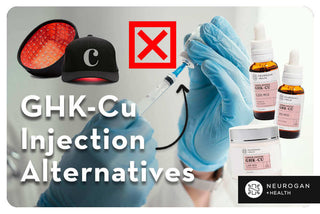Dealing with thinning hair or skin issues can feel like more than just a surface problem for many of us. In the United States alone, hair loss is a significant concern, affecting 56 million individuals (35 million men and 21 million women) [1, 2].
And when it comes to skin conditions, acne and aging skin are among the most prevalent concerns. But here’s some good news in our journey to feeling and looking great: topical GHK-cu peptide products.
Copper peptides (tripeptide glycyl-L-histidyl-L-lysine) are small fragments of proteins combined with a copper molecule with an affinity for skin cells, but can also be taken in tablet form to support copper defficiencies. Scientific studies support using these compounds to promote hair growth, enhance skin elasticity, and support the healing process [3].
The effect of copper peptides is stimulating the production of collagen and elastin. On top of this, they also possess antioxidant properties, which help fight off the damage caused by free radicals and the stress of modern life.
Traditionally, these peptides are administered through injections for a direct and potent approach, but they can have drawbacks, like cost and risk of infection (especially if not done professionally).
What are GHK-Cu Peptide Injections?
GHK-Cu peptide injections involve the direct administration of copper peptides into the skin or scalp. Microneedling, a popular method, facilitates the delivery of these peptides by creating tiny punctures in the skin, enhancing absorption and efficacy. 
Benefits of GHK-Cu Injections
The allure of GHK-Cu injections lies in their inherent ability to deliver precise dosages and more potent concentrations of copper peptides deeper into the skin to promote collagen production, which helps with skin firmness, wound healing, and even hair growth [3].
It makes for a much more efficient delivery method of the active GHK-Cu, which can penetrate through the layers of skin through injection, but that doesn't come without its risks.
GHK-Cu Injections vs Creams
GHK-Cu injections deliver concentrated doses subcutaneously for quicker, targeted results like hair growth and skin rejuvenation but require medical supervision.
Serums and creams, on the other hand, provide a gradual, non-invasive way to benefit from GHK-Cu, fitting seamlessly into a daily skincare routine. Serums penetrate deeper for targeted results, while creams offer broader skin coverage and hydration.
Ultimately, we would say that injections are best for intensive treatments like for healing hair, while serums and creams suit those preferring subtle type.
Side Effects of GHK-Cu Injections
Using needles can introduce the risk of infection, and the potent concentrations might prove too strong for some, irritating. Additionally, the procedure can be painful, deterring many from choosing this method.
To add to this cautionary note, we've noticed that injectable GHK-Cu options are making their rounds online and even on popular marketplaces like Amazon. We want to underscore that just because you can buy them online doesn't mean that injectables at home are a safe practice.
Doing it yourself without professional guidance could damage your skin, scalp, and overall health. Injectables are not a DIY project and should be administered by trained professionals in a controlled environment.
GHK-Cu Safety Guideline
Yes, GHK-Cu is generally safe when used in a moderate doses & is reviewed under professional supervision. Topical GHK-Cu products is usually the more tolerated product for all skin types. If opting for injections, we recommend to review the product’s ingredients and source before moving along with a procedure as such.
Are Copper Peptide Injections Safe?
When performed in a clinical setting by professionals, copper peptide injections can be safe. However, the potential for side effects and the invasive nature of the procedure make it essential to consider alternatives seriously.
Are Topical GKU-Cu Products Safe?
Topically applied copper peptides, in concentrations up to 4%, are generally considered safe and well tolerated by all skin types. This makes serums, creams, and other non-invasive treatments an attractive option for those seeking the benefits of copper peptides without the risks associated with injections.
How Do GKU-Cu Peptides Work
GHK-Cu has many benefits for skin appearance and hair health. Here's a quick rundown:
Promoting Collagen and Elastin Production
GHK-Cu directly stimulates cells in the skin and follicles to produce more collagen and elastin. Think of collagen and elastin as the building blocks of your skin and hair—collagen keeps your skin firm and youthful, while elastin gives it that nice, bouncy elasticity. This is why copper peptides are known as "anti-aging peptides."
When it comes to hair, collagen surrounds each hair follicle, supporting hair growth and strength.
Would Healing
GHK-Cu has been found to support skin remodeling, accelerate wound healing, and support regeneration, thanks to their anti-inflammatory and antioxidant effects observed in various studies [4].
Regulating Gene Expression
On a more technical note, GHK-Cu has the fascinating ability to modulate gene expression.
This means it can turn certain genes on or off, influencing processes like inflammation, immune response, and the synthesis of key proteins. This regulatory capability contributes to its healing and rejuvenating effects [5].
Supporting Hair Follicle Size & Growth
For people experiencing thinning hair, research into GHK-Cu & AHK-cu peptides suggests it has potential benefits in supporting hair health by encouraging healthy hair follicle growth and enhancing hair appearance [6].
Alternatives to GHK-Cu Injections

Injections aren't exactly the most accessible form of getting the benefits for skin rejuvenation or hair care, but thankfully there are other ways of using copper peptides.
GHK-Cu Hair and Scalp Serum by Neurogan Health
Enriched with a potent concentration of copper peptides, this hair and scalp serum taps into the science of copper's role in supporting the scalp's natural environment, which may help with the appearance of hair density and volume when used consistently.
Our serum blends natural, traceable ingredients for peace of mind. It's universally formulated, making it a perfect fit for all hair types and genders, and specifically tailored to meet the needs of thinning hair across all textures.
4% GHK-Cu Face and Neck Serum by Neurogan Health

We chose a 4% concentration of Copper Tripeptide-1 for our Face and Neck Serum after discovering it strikes the perfect balance between efficacy and gentleness. This concentration is high enough to support the desired skin benefits, such as a refreshed look, while still being gentle enough to be absorbed without irritating the skin. This careful formulation ensures our serum can be used by everyone, even those with sensitive skin, to help their skin feel rejuvenated.
4% GHK-Cu Face and Neck Cream by Neurogan Health

We found that the best way to get the benefits of copper peptides is with a daily routine, which is why we've made this 4% copper peptide face cream for daily use.
Its deep hydration formula is rich yet leaves no greasy residue, designed for consistency and gentle enough for every day. This cream, cruelty-free and made with premium ingredients in a GMP-certified USA facility, can stand alone for a simplified routine or be paired with our face and neck serum for enhanced benefits.
2% GKU-Cu Eye Serum by Neurogan Health

The skin around our eyes is very thin and requires special care, especially when it comes to an anti-aging routine.
Our Eye Serum contains a 2% GHK-Cu, targeting aging signs like fine lines and discoloration with a concentration gentle enough for the delicate eye area. This lightweight serum absorbs quickly, making it a seamless addition to your routine.
It can be paired with the Face and Neck cream or any lightweight cream to protect your natural skin barrier and to help support skin firmness.
Red Light Therapy

If you've been on the look out for at-home devices to compliment your anti-aging skin care routine or support hair growth, then you've likely encountered red light therapy devices.
Combining GKU-Cu treatments with red light therapy could offer synergistic benefits. Red-light therapy uses infrared light to support cellular energy and repair processes, potentially boosting the effectiveness of copper peptides.
This dual approach can enhance collagen production and accelerate healing for a more powerful anti-aging and hair growth strategy. For home use, the CapillusUltra Mobile Laser Therapy Cap comes highly recommended for its convenience and effectiveness in delivering red-light therapy for scalp health.
For an affordable red-light therapy mask that's great for anti-aging at home, the Project E Beauty RED Light Therapy Machine is also a popular choice.
Alternatives to Injecting GHK

Topical copper peptide treatments such as serums, creams & even copper nasal sprays are a financially accessible and routine-friendly alternative to GHK-Cu injections.
These options allow the benefits of copper peptides for skin and hair care to be within reach and mitigate the risks associated with injectables.
By including these gentle yet effective products in daily care, you might be able to take advantage of the rejuvenating potential of copper peptides, fostering both safety and efficacy in their pursuit of slow-aging wellness.
Resources:
- Scandinavian Biolabs. (2024). 53 comprehensive hair loss statistics of 2024 for journalists. Retrieved from https://scandinavianbiolabs.com/blogs/journal/hair-loss-statistics
- American Academy of Dermatology. (n.d.). Skin conditions by the numbers. Retrieved from https://www.aad.org/media/stats-numbers
- Al-Atif, H. (2022). Collagen supplements for aging and wrinkles: a paradigm shift in the fields of dermatology and cosmetics. Dermatology practical & conceptual, 12(1).
- Pickart, L., & Margolina, A. (2018). Regenerative and protective actions of the GHK-Cu peptide in the light of the new gene data. International journal of molecular sciences, 19(7), 1987.
- Pickart, L., & Margolina, A. (2018). The effect of the human plasma molecule GHK-Cu on stem cell actions and expression of relevant genes. OBM Geriatrics, 2(3), 1-14.
- Lee, W. J., Sim, H. B., Jang, Y. H., Lee, S. J., & Yim, S. H. (2016). Efficacy of a complex of 5-aminolevulinic acid and glycyl-histidyl-lysine peptide on hair growth. Annals of dermatology, 28(4), 438.




